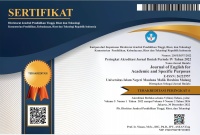Abstract
Literature is a social phenomenon that is associated with writers, readers, and related aspects of human life that is expressed in a literary work. In this view, when someone attempts to analyze drama script to comprehend more about the drama, to conduct a discourse analysis on drama plays a significant role in the success of the analysis. Script or screenplay is one of literary work. There is 18 character education in Indonesia according to Panduan Pendidikan Karakter, Kemendikas 2010. They are: Religious, Honest, Disciplined, Hard Working, Creative, Independent, Democratic, Curious, Nationalistic, Patriotic, Sportive and respectful, Inclusive and Communicative, Peace-loving, Studios, Caring and Compassion, Empathetic, Responsible. This study is aimed at two primary purposes: (1) to investigate the moral values in ‘Twilight’ film script, (2) to investigate the moral values to build someone's character. This study was carried out the script of Twilight film written by Melissa Rosenberg. To achieve two objectives, the data were analyzed by collecting and reviewing the document. After moral values have been collected, they are analyzed and categorized the moral values that could be implemented to build a student's character. The result of the research is that there are some moral values in Twilight film script that could be implemented to build student's character, they are (1) Honest, (2) Independent, (3) Curios, (4) Patriotic, (5) inclusive and Communicative, (6) peace-loving, (7) Empathetic and (8) Responsible. Those eight characters are a good character that could be implemented to build the students' character. Suggestion proposed based on the result analysis toward moral value in Twilight film script should be used as one of the references. In education, especially for teachers, it is imperative to build the students character
References
Arikunto, S. (2000). Prosedur Penelitian: Suatu Pendekatan Praktek. Jakarta: Rineka Cipta.
Afifi. (2013). Pengantar Kajian Sastra. Jakarta: Pinus.
Bogdan, R. C., & Bikken, S.P. (1998). Qualitative Research for Education: An introduction to Theory and Method 3rd edition. USA: A Viacom Company.
Denzin, N. K., & Yvonna S. L. (2009). Handbook of Qualitative Research. Terj. Dariyatno dkk. Jogjakarta: Pustaka Pelajar.
Perrine, Laurence. (1984). Literature, Structure, Sound, and Sense. New York: Thompsons Wadsworth.
Novick, Bernard et al. (2002). Building Learning Communities Character. Library of Congress Cataloging-in-Publication Data. USA
Semi, A. (1990). Metode Penelitian Sastra. Padang : Angkasa.
www.raindance.co.uk/site/picture/.../Twilight.pdf retrieved on October 20, 2013












